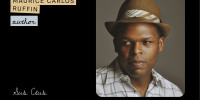7 Writing Retreats Around the World For Emerging and Established Writers
electricliterature.com – Sunday March 9, 2025
Writing retreats offer the opportunity for writers to fully immerse themselves in their craft, free from the distractions of daily life. These getaways combine inspiring locations, structured time, and a like-minded community to reignite creativity and boost productivity. Whether you’re seeking solitude to finish a manuscript or a collaborative environment to workshop ideas, a retreat can serve as the perfect catalyst.
I run a writer’s retreat called Studio Luce, steps away from the black sand beach of El Paredón, on the Pacific coast of Guatemala. The retreat is hosted in a 3-bed villa, featuring a newly built writing studio, alongside a tropical garden and pool. We offer week-long author-led retreats throughout the year, bringing together small groups of writers to focus on their craft.
While some retreats are well-known—particularly in the U.S.—there are many hidden gems scattered around the world that offer equally transformative experiences. Here are 7 unique international writing retreats for when you need to get away and focus on your writing:

The Trials and Tribulations of Writing Submissions: A Chat with Professor Emma Törzs and Professor Ben Voigt
macalester.edu – Saturday March 8, 2025

It is March 7th, and if you’ve been regularly scanning the English department emails, you’ll know that today is your final day to submit to the department’s three esteemed writing contests. Today, writers, the arduous two-month waiting period commences. Rather than fret over your submissions, The Words is here to offer solace in the wisdom of Professor Emma Törzs ’09 and Professor Ben Voigt ’10, two of the department’s very own contest winners and talented authors.
Professor Emma Törzs won the Harry Scherman Writing Contest in the category of Creative Prose, and Professor Ben Voigt was selected as the Macalester Finalist for the Academy of American Poets Prize.
Do you recall any part of the writing process for your submission?
B: I was working with a mentor, but I switched from fiction to poetry at the end of undergrad. I wrote this piece for an independent study, and it was inspired by and went along with an art installation. The piece was very narrative, but it had a turn near the end, a volta, and I remember thinking, “So, this is what a poem feels like.”
E: Well, my first experience of writing short stories was in college, believe it or not, in Peter Bognanni’s class. Because I started writing short fiction in creative writing classes, my experience of writing fiction was always sort of tied with the idea of deadlines and readership, which I think has actually helped me a lot. Having readers in mind, having an audience in mind, and working with deadlines is something that you continue to do long out of college if you want to keep writing.

Brilliant writing advice from famous authors
scottishbooktrust.com – Wednesday March 5, 2025

Looking for a little bit of inspiration from the greats? Author Sarah Forbes Stewart shares her favourite writing advice from some of the best writers around.
Writing! The best job in the world – but also, sometimes, the most impossible. If you’ve ever wanted to write, or you already write but are tortured by the blank page staring up at you, maybe it’s time to get some tips from the greats.
Zadie Smith
Zadie Smith, in an interview from 2010, offered this excellent nugget: 'Try to read your own work as a stranger would read it, or even better, as an enemy would.'
I like the brutality of this simple advice. We can all fall in love with our own ideas, characters and dialogue. It’s a worthwhile skill to leave some breathing space and come back to your writing with a critical eye.
F. Scott Fitzgerald
In a 1938 letter to an aspiring author, Fitzgerald wrote: 'You’ve got to sell your heart, your strongest reactions, not the little minor things that only touch you lightly, the little experiences that you might tell at dinner.'
You can write about anything you like – anything! – but you have to put your heart into it.

Eric Puchner: How to Be Funny When Writing a Novel
lithub.com – Saturday February 22, 2025

Is anything more embarrassing than trying to be funny and going splat? I sometimes think there’s an inverse relationship between trying to be funny and actual funniness. This is especially true in literature, I think. When you think of great comic novels and short stories—True Grit, Mrs. Bridge, On Beauty, anything by Joy Williams—you think, above all, of their effortlessness, how what’s funny about them is inextricable with their, well, novel-ness. They can’t fail to be funny, because they hardly seem to be trying to. They don’t strain after jokes so much as evoke the inherent funniness of life.
The philosopher Henri Bergson talks about “mechanical inelasticity”: something is funny when a person—or, I suppose, an animal—fails to adapt to a change in their surroundings. Think of the unsuspecting fellow who tries to sit down on a chair that’s been pulled out from under him. We expect someone to act a certain way, one that conforms elastically to the situation they’re in, and it’s funny when they don’t. As Simon Critchley puts it, in his book On Humor: there’s a disconnect between “expectation and actuality.”
This isn’t just a nifty, somewhat incontrovertible theory of humor. It’s a nifty, somewhat incontrovertible theory of what makes a novel or short story work. One might even say that a disconnect between expectation and actuality is the essential element of fiction. A young man wakes up as a beetle and yet worries more than anything about getting to work on time (“The Metamorphosis”); a wealthy couple insist on finishing their dinner at a country club, despite the fact that a tornado’s approaching and everyone else has fled to the basement (Mrs. Bridge). When my students complain about writer’s block, that they have no idea what to write about, I often encourage them to think of something funny that’s happened to them: not because I want their readers to laugh out loud—though there are far worse things a reader might do!—but because something that meets the criteria for funniness also meets the criteria for engaging fiction. The sound of laughter is the sound of a story succeeding.

‘Golden age’ of self-publishing for indie authors ‘no longer strictly choosing one route or the other’
thebookseller.com – Saturday February 22, 2025

There is something in the air in the self-publishing world at the moment; just ask the Alliance of Independent Authors’ (ALLi) co-founder and director Orna Ross, who has watched the sector develop over the past decade and a half. Though she still does not see traditional and self-publishing as “sitting together that much”, she believes “it’s a hugely exciting time to be an indie author”.
Former Harper Press managing director John Bond (pictured), turned CEO and co-founder of Whitefox – which launched in 2012, offering a “curated network of publishing specialists” to companies and individuals, many of whom are self-publishers – agrees.
He says: “There’s still a bit of a stigma around self-publishing, but it’s changed, because more people want to have creative control of their own books. They want to do things in a time frame that suits them, rather than hope that they will find an agent, and that the agent finds a publisher, and at some point, in the future, that book is published. New writers are saying: ‘I can do something relatively quickly and learn how to be an entrepreneurial, self-starting author.’”
This is what Monique Charlesworth, who founded Moth Books in order to publish her own (and now others’) books, wanted to do with its launch title, her book Mother Country: “I published four titles traditionally, and I worked with marvellous people, but they didn’t care like I did about the cover, about the quotes. They weren’t necessarily great at communication and publicity.”

How to Write a Novel: A 7-Step Guide
snhu.edu – Wednesday February 19, 2025

Writing a novel is a process that begins with an idea, develops through outlining and creating compelling characters and grows with a consistent writing routine and revising.
If you want to become a novelist, your first book can feel like a daunting task. But, with the right approach, it can also be a manageable process. Whether you’re starting with a vivid idea or simply a desire to tell a story, breaking the process into clear steps can help you bring your vision to life.
1. Understanding What a Novel Actually Is
A novel is a long-form work of fiction, typically spanning 250–400 pages, according to Jeremy Flagg, a dystopian and sci-fi novelist with the books "Nighthawks" and "Night Shadows" to his credit. He’s also an adjunct faculty member in the online creative writing and English program at Southern New Hampshire University (SNHU).
“Whether exploring seemingly insignificant moments of life or diving deep into the essence of what it means to be human, novels allow writers to weave expansive narratives that capture the complexities of the human experience," he said.
2. Starting With an Idea
When it comes to writing a novel, authors find inspiration in different ways.
Ideas can come from the shows you love or mundane places, said Flagg, who’s often inspired by watching crowded spaces or TV. Once it takes shape, he said, it can be developed further by imagining unique situations and building the story around them.
Choosing a topic or theme you care about makes the process more enjoyable and authentic. Beginners should write about something they are passionate about, he said.

How to Write a Novella - With Paul Michael Anderson
litreactor.com – Thursday February 6, 2025

When the newly reformed LitReactor asked if I’d be interested in writing a how-to article on novellas, my knee-jerk answer (to myself) was: “How the hell should I know?” It’s a strange answer, one I should probably unpack with my therapist at some point, because — putting my own neuroses aside — I do know how to write them.
As of 2025, I’ve written five novellas: Bones Are Made To Be Broken, Standalone, How We Broke (with Bracken MacLeod), The Only Way Out Is Through, and You Can’t Save What Isn’t There — and only one of them was a whoopsie-daisy, didn’t see a novella there, son. With the other four, it was deliberate action; I wasn’t creating a short story or developing a novel, I was writing a novella, and I knew it.
On that note, allow me to show you how it’s done.

Have we reached peak imprint?
thebookseller.com – Thursday February 6, 2025

Imprints are great business, but is their prestige and value getting diluted as they proliferate?
For decades now, the ‘Big Five’ publishers have been swelling in size by amassing a huge number of imprints: names under which they publish that each focus on a specific genre, market or type of book. Some, such as Virago or Fourth Estate, used to be independent publishers, but many, such as Hachette’s Brazen Books or Penguin’s Fern Press, began within these larger organisations. The question is, does the industry have too many imprints and do they influence how readers behave?
A good place to start, perhaps, is with Penguin Random House, home to the largest collection of imprints in the UK. Its website states that the company owns "300 editorially and creatively independent publishing imprints... together, our imprints publish over 70,000 digital and 15,000 print titles annually, with more than 100,000 eBooks available worldwide".
Take a moment to process those numbers. In the UK, the average number of books a person reads each year is 10. Given the sheer scale of PRH’s operation, it’s not surprising that dividing itself up into imprints is helpful: they form an infrastructure that maintains variety in this behemoth company.

On Navigating 300 Rejections and Learning to Write Fearlessly with Maurice Carlos Ruffin
subclub.substack.com – Thursday February 6, 2025

Welcome to our interview series, On Something with Somebody! This week, Maurice Carlos Ruffin, author of The Ones Who Don’t Say They Love You, shares his thoughts on being a joyous and aggressive writer, the many rejections of his early career, celebrating with ice cream, and his submissions strategy.
"During a seven-year stretch, my work was rejected over 300 times by literary magazines. I had to accept that if I wanted to publish, I had to change both the work and my approach."
Kailey DelloRusso: When you were first starting out, how did you take rejection? And what did you learn from those first few rejections?
Maurice Carlos Ruffin: I didn't take it well. The first rejection I can recall was from my undergraduate literary magazine. Frankly, I was devastated. I stopped writing stories for about four years and stopped submitting for maybe six.
Later, I came back to writing and went to grad school. I still got rejected quite often. In fact, during a seven-year stretch, my work was rejected over 300 times by literary magazines. Fortunately, I can thank Stephen King's On Writing for giving me perspective and gumption. He was rejected, I think 200 times before the age of 18. He used to pin the rejection slips on the wall above his typewriter. How could I complain?
Ultimately, I had to accept that if I wanted to publish, I had to change both the work and my approach. I sharpened my stories and became more strategic about my submission strategy. Basically, I made the stories sound more like the place I'm from (my weird, wonderful New Orleans) and made them faster-paced and more emotionally charged. For submissions, I used Duotrope, which allowed me to figure out which high-quality magazines I had the best shot of being published by. I entered many contests and won three. As Biggie Smalls said, "I went from negative to positive."

Trying to write a novel? A Marrakech ‘book camp’ might unlock your literary skills
ft.com – Monday January 27, 2025

There’s nothing like shopping to form a bond between strangers. It was the glue for two women of letters who met at Lahore Literary Festival a few years ago. “We ended up hanging out, talking about books and shopping. There is a great picture of us in an old haveli. I remember your hair was bright blue, and a blue parrot settled on your shoulder,” says Bloomsbury editor Alexandra Pringle of her encounter with future creative partner, the writer and historian Alex von Tunzelmann. The blue hair is long gone, although von Tunzelmann has gone for purple ahead of their next writing masterclass.
Together with their mutual friend, editor and literary consultant Faiza Khan (Pringle had hired her to run the Bloomsbury list in Delhi), they talked of opening a boutique with a curation of goods and artefacts truffled from their travels. “We realised that our love of objects is founded in storytelling – I do believe everything holds a history and a life,” says Pringle, who lives on a houseboat in Chelsea filled with Staffordshire figures, fine porcelain and ancient finds from Morocco. The idea of a writing retreat then blossomed with the input of author and journalist Nesrine Malik, and, in 2022, Silk Road Slippers was founded.
There are myriad writing retreats out there, often staged in picturesque locales such as the south of France and largely attracting a certain tranche of middle-class England. This literary double act, however, was determined to establish a fully immersive workshop with hands-on exercises, seminars, one-on-one feedback and the central attraction of a guest author. The masterclasses held in Marrakech got underway in November 2023 with Shehan Karunatilaka as the first guest author. Esther Freud (23-28 February) and Alan Hollinghurst (2-7 March) are top billing for the upcoming spring masterclasses, which cost £3,200 per person (with a £1,000 deposit payable on acceptance).
Get the free newsletter | Submit a news item or article | Get Writers' News for your website





